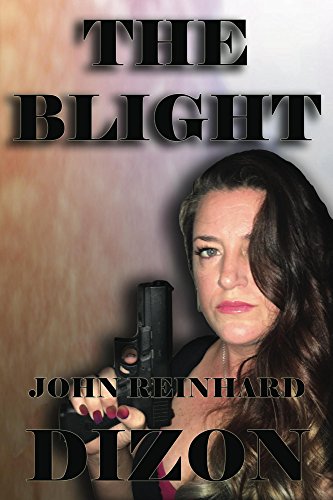 Meet Kirsten Streicher, kick-ass heroine of The Blight, another nail-biter, suspense thriller by John Reinhard Dizon. First, a little about Kirsten and her story:
Meet Kirsten Streicher, kick-ass heroine of The Blight, another nail-biter, suspense thriller by John Reinhard Dizon. First, a little about Kirsten and her story:
Kirsten Streicher is an Iraq War veteran assigned to the Supercop Unit in St. Louis. The elite unit has been successful in combating the Blight, a plague of poverty-driven crime that is overwhelming the city. Only a genocidal sociopath has declared his own war against the Blight and is conducting a campaign to eradicate the undesirable elements within the community. The death of one of her partners and the suspension of another portend the breakup of the team. Kirsten is forced to deal with a major change in her career path once the man called X is brought to justice. She is also involved in a romance with a UMKC professor, Kurt Franz. He takes her to a new reality amidst the protests of Brad, who is still hunting the killer despite his suspension. Brad reveals his love for her and places her in the middle of a love triangle. Making matters worse is evidence indicating that X is focusing on Kirsten, which makes her a potential target.
MF: Welcome, Kirsten. It’s a pleasure to have you here today.
KS: I’d just like to thank the interviewer for being so patient in allowing me to put my thoughts together. This has been a harrowing and traumatic time in my life. I’m finally able to articulate my feelings and my reflections, and I hope they might inspire young people out there trying to make the world a better place.
MF: I understand. The aftermath of such a time is often the most difficult, and you’ve had several such experiences in your life. Looking back to those that made you who you are, did any particular experience you had while serving in the Middle East have a life-defining effect?
KS: It had to be in Afghanistan when we took out that insurgent Taliban unit in preventing an ambush of American soldiers. We found out they were just high school kids who had been brainwashed into fighting for someone else’s cause. During the Blight, I saw the same thing in the teens who were recruited by drug gangs to advance the ulterior motives of others. Kids are so idealistic and easily influenced. Society has a tremendous obligation to raise our children in a moral and principled world.

MF: That is so true. Kids are always going to reflect their environment and how they’re raised. When parents fail, often law enforcement is forced to fill the gap. As such, what do you find the most satisfying part of being a cop?
KS: The chance to make a difference in society and defend the oppressed and underprivileged. It was the same thing we tried to do in the Middle East. We tried to do it here but we never dreamed we’d be dealing with the same kind of evil. At least we had the battle experience, and I hope that other veterans will be able to use their skills and knowledge to change things here at home.
MF: It’s so sad that our veterans come home to that, but it’s true they can definitely make a difference here as well. Nothing is simple these days. Do you see crime in terms of black and white or are there shades of grey?
KS: That is such a hard question. Good is good and evil is evil, that’s your black and white. Only the effect it has on others is where your shades of grey come in. It’s so hard to deal with victims of crime, especially in gang-controlled neighborhoods where they live. The Blight nearly immersed the city of St. Louis in the darkness. It was a miracle that we were able to help its citizens find their way back to the light.
MF: Yes, it truly was. And it certainly wasn’t easy. If you were “Queen of the World” for a day, what would you change?
KS: I would eradicate drug trafficking by any means necessary. It is what empowers drug gangs, poisons its victims and destroys communities. Cut off the supply, put dealers away for good and do everything possible to rehabilitate dependents. It is the singlemost terrible problem the people of the world are dealing with.
MF: I couldn’t agree more. What was the happiest moment of your life? The saddest?
KS: Waking up Christmas morning to find goodbye letters from the two most important people in my life. It created a void in my heart, in my existence, that I may never refill. I can’t even remember a happy time. I think readers of my story will fully understand why.
MF: I hope with time that some level of happiness and satisfaction will come your way as you recognize how many lives you have changed in a positive way. They say what doesn’t kill us outright only makes us stronger. In that context, what did you learn from your experience with “The Blight”?
KS: Well, let me take back that last statement. Seeing the people of St. Louis unite to keep the murderers from destroying Christmas was the most wonderful thing I ever saw. Black and white, rich and poor, Christian and Muslim, it didn’t matter who they were. We all became neighbors, we shared and shared alike. The citizens of our city decided they had enough of the Blight and made it go away. Americans have that in common, we stand together in times of trouble. It makes me so proud to be an American and a Missourian. I hope my story helps other people feel that way.
MF: Thank you so much for being with us today, Kirsten. The world needs more people like you in this crazy world we’re living in. I wish you all the best and that you’ll be blessed for all the good you’ve done.
Be sure to pick up a copy of The Blight so you can put Kirsten’s comments and insights into context. You can grab your copy from Amazon here.
Stock Photo copyright 123RF
eric1513/123RF Stock Photo


 Meet Kirsten Streicher, kick-ass heroine of The Blight, another nail-biter, suspense thriller by John Reinhard Dizon. First, a little about Kirsten and her story:
Meet Kirsten Streicher, kick-ass heroine of The Blight, another nail-biter, suspense thriller by John Reinhard Dizon. First, a little about Kirsten and her story: